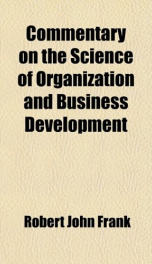commentary on the science of organization and business development

Purchase of this book includes free trial access to www.million-books.com where you can read more than a million books for free. This is an OCR edition with typos. Excerpt from book: CHAPTER H. COEPOEATE FINANCING. Capital, Bonds and Stocks. Transferring An Established Capitalization of Corporations. Business to a Corporation. Baising Additional Capital. Capital, The questions of finance are stocks. among the most difficultif not the most importantwith which the organizer of a business corporation has to deal, and like other questions of business policy, they are necessarily governed by the circumstances of the undertaking in hand. It is now unnecessary to argue the importance of financial plans and precautions in the organization of a corporation which is to own and operate an important industry, or where the same is created for the purpose of reorganization of an established business; the discussion that follows deals more at length with the subject of what is now termed "Corporation Finance" and particularly with the staple securities created by corporate bodies. It is necessary for a correct understanding of the questions of Corporate Financing that the distinction between the terms capital stock, shares of stock and capital be understood. At the same time, an understanding of the nature and peculiar characteristics of stock as property is essential. The difference between the capital stock and capital of a corporation is, that the former constitutes the amount divided into shares or parts at which the incorporators have limited the issuance of stockin other words, the amount upon which calls may be made upon the stockholders and dividends paid; while the capital of a corporation is the proceeds of the sale of this capital stock, and, in addition thereto, all money or property of the corporation acquired from any and all lawful sources. The former amount remains the same until changed by consent of the State, while the latter ...
Info about the book
Author:
Series:
Unknown
ISBN:
1110428235
Rating:
4/5 (4)Your rating:
0/5
Languge:
English
Users who have this book
Users who want this book
What readers are saying
What do you think? Write your own comment on this book!
write a commentif you like commentary on the science of organization and business development try:
Other books by this author
Do you want to exchange books? It’s EASY!
Get registered and find other users who want to give their favourite books to good hands!

